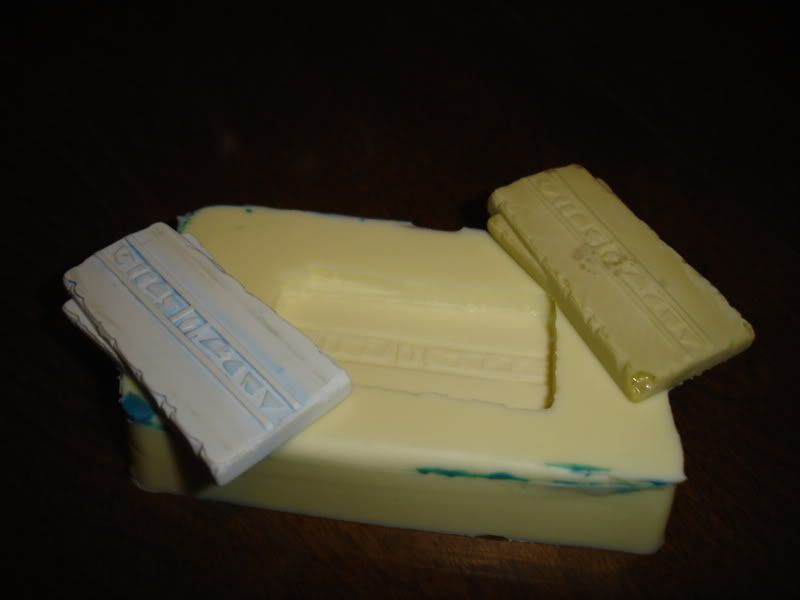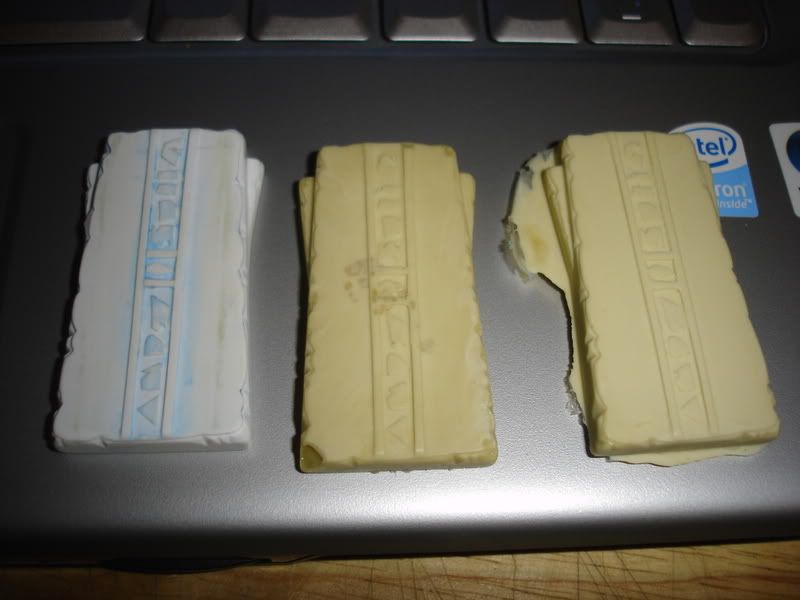Re: My frst mold/cast ever. Queston about mixing.
Your particular mold making material may need a vulcanization to make it totally stable. It may also be that the mold making material will de-gas and cause problems in your castings (especially with clear resins which tend to be sensitive to moisture and lots of other things). The baking may be the manufacturer's way of helping the mold material de-gas.
You do NOT want your mold warm when you're pouring resin. It'll cause the resin to "snap set" or kick off too quickly.
And you are ALSO taking ALL NECESSARY PRECAUTIONS when you pour, yes???
If you are unsure what the safety precautions are for molding and casting, EDUCATE YOURSELF. This crap, no matter how fun it is or how widely it is used by hobbyists, IS TOXIC. Do not be fooled. Do not think you're immortal or somehow immune to it's effects. Even if you don't feel them right off.
more on the subject:
What everyone should know about urethane
Here's the low-down: Urethane, when it cures, releases Isocyanate gasses. Sound familiar? That's because the root word is Cyanaide... a poison.
Isocyanates are long-term poisons that build up in your system. Your body will try very hard to get rid of them, but they don't like to go easily. Exposure to them (even regulated exposure) will eventually cause them to build up in your body and make you ill.
The amount that it takes varies from person to person, and the time it takes to build up in your body varies as well. But over time, you will develop a sensitivity to them.
Typical symptoms include: shortness of breath (induced athsma), skin rashes, itching, throat irritation, dizziness, and oddly enough, back pain. Other, less obvious effects are irritability, short temper, and even paranoia.
But like I mentioned, this all varies from person to person.
So, how to avoid all this? Easy:
1) get yourself a NIOSH approved filter mask with the biggest, most ass-kicking filter cartridges you can buy. Make sure your catridges are the highest rated ones you can get. They won't completely protect you, but they will help limit the exposure through your lungs.
2) set up your workspace so that you are cross-ventilating to the OUTDOORS. This means you need to have a CONSTANT flow of air running through your space. Clean air must enter at one end and fume-y air must be vented out the other end. Be sure you don't vent right into an area that supplies air to another house or building. Your fumes will just get sucked up and deposited into their space.
3) always wear latex (or if you're allegic to latex) nitrile gloves when handling the urethane components or the mixed combo. Not only can Isocyanates enter your body through the lungs as fumes, but they also affect you through the skin. Be sure to get yourself some of those disposable tyvec jumpsuits they use when they paint cars. It'll keep you from wrecking your clothing.
4) Use and Do all the stuff above.
5) If you feel like you've started to show any of the signs of overexposure, you need to get away from the stuff. Take a break from it for at least two weeks. In the mean time, you can exercise and pump your lungs good and hard...run, bike, whatever. Drink A LOT of water. It helps your body get rid of the toxins. And best of all, get thee to a sauna. Especially after you workout. A sauna will force you to sweat alot and encourage your body to expell the toxins that way.
if you got a chemical from a chemical supplier or industrial arts supply house, you should have gotten an MSDS. If you weren't given a MSDS (Material Safety Data Sheet) when you bought it, you should go back there and get one. Every chemical available to the populace MUST have an accompanying MSDS. It is the law. Read the MSDS carefully and it will tell you the make-up of your resin system. If you have any questions at all, just pick up the phone and call the manufacturer. They will be happy to answer your questions about the specific product.
Rant ends.
-Gordon
P.S. Any idea how I know all this? Personal experience.







